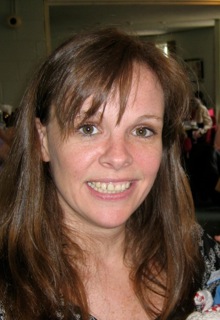By Susan Banister  Susan Banister @susanbanister
Susan Banister @susanbanister
Learning through mobile technology is not a new concept. But as yet it has not been taken up by huge numbers of schools. Mobile technology means more than smartphones. It includes iPads, iPods, netbooks, e-readers, Nintendo DS's, GPS devices. The Curriculum ICT team at Bradford in the UK teamed up with its City Learning Centres and embraced mobile learning head on with their bMobLe project (short for Bradford mobile learning).
I had the pleasure of attending the bMobLe conference, now in its third year, which had the theme of Creating Creativity. There was plenty to inspire from geocaching outside with James Langley (@lordlangley73) to iPods in the classroom with the wonderfully entertaining Thomas, Sam and Lewis from Worthinghead Primary School. Creativity was there in abundance with superb presentations from Dan Roberts (@chickensaltash) on using web 2.0 tools, David Mitchell (@deputymitchell) and John Sutton @HGJohn) discussing blogging, Dawn Hallybone (@dawnhallybone) on games-based learning, David Rogers (@davidErogers) on Mission:Explore and various members of the Curriculum ICT team Paul Scott (@pederosa), Vicki Cox (@vickit23) , Tim Bleazard (@idletim), Robert Bashforth(@rbashforth) and Steve Dale (@stevedale).
Key note speakers were Andy Hutt (@andyhutt) and Dwayne Saxton. Andy is an ex-secondary English teacher who now works with schools and educational providers to support a creative, efficient and effective use of ICT. He spoke about creativity being open for all with technology. We can all be an artist, photographer, composer, film-maker. He showed an inspirational film that makes you think about how simply changing the words can really make a different to the impact of the message. You can see it here.
Dwayne is Principal at Appleton Academy in South Bradford. It is an all through school 3-19. This school uses multiple types of devices and see IT as a tool that has to be ubiquitous. Their IT solution delivers creativity and working in many different ways: important in an all through school. Theirs is an open mobile phone policy with the ability for the children to access the wireless network. How refreshing to hear! Dwayne felt that it is about managing the opportunity and developing self management by the pupils.
But as with all these things the basics should not be forgotten and I went to a great session by Mark Ellis. His message was simple but important. Make sure the infrastructure and wireless network is designed to support what is trying to be achieved. Who is going to manage it and the devices? Have you got a scalable solution? Two other issues were also raised. Sustainability is something that needs to be considered by schools. And the importance of training should not be understated. Paul Scott said that 25% of the school spend on mobile devices should be spent on training.
The one thing that stood out from all of these presentations was not how great the gadgets are but the impact that they were having on learning. Changing the educational paradigm around mobile technology is not going to be easy. But learning from the success of Bradford could make it less difficult.
Case studies from the project can be found on the BMoble website.
Susan Banister is the Strategic Business Development Manager for UniServity. She has worked with learning technology in schools for over ten years. For many years she worked for Espresso Education and Channel 4 Learning developing their business. She was responsible for the promotion of learning platforms, education applications and content delivery across the country. She has worked in both the primary and secondary sectors. She was involved with Building Schools for the Future programme before its recent demise. She is also a governor of a secondary special school in Bolton, England.
This article was first published in Computers in Classrooms, the free e-newsletter for educational ICT professionals.
